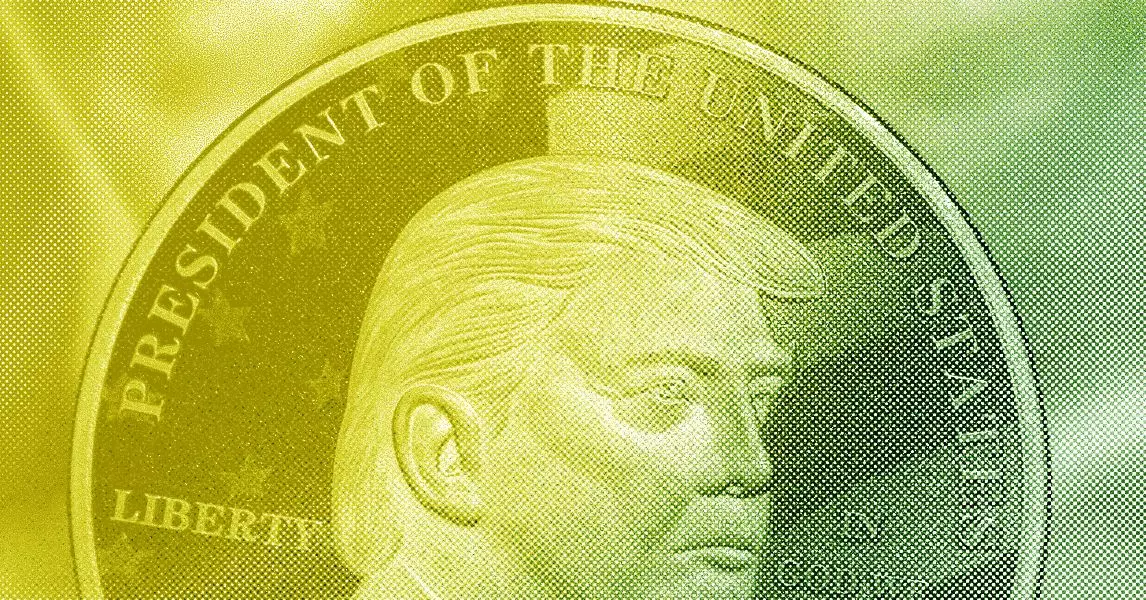In the rapidly evolving space of digital finance, the intersection of politics and cryptocurrency presents a convoluted paradox that raises ethical and constitutional questions. With figures like Donald Trump stepping into the crypto arena, one cannot help but scrutinize the implications of such ventures. The world of cryptocurrency, once viewed with skepticism by the former president, has seen a dramatic shift in perspective. From divisive commentary to a self-branded cryptocurrency, Trump’s foray into this digital landscape challenges the norms of both finance and governance.
The concept of cryptocurrency itself is often diluted in public discourse. At its core, it represents a decentralized financial system, untethered from traditional banking structures and governmental oversight. This independence gives rise to both opportunity and risk, as the value of digital currencies fluctuates wildly based on market sentiment rather than any intrinsic value. Considering the precariousness inherent to this realm, it becomes increasingly controversial when influential figures seek to exploit these currencies for personal gain.
Trump and the Emergence of TrumpCoin
The announcement of TrumpCoin has not only stirred significant public intrigue but also investment frenzy, culminating in a private dinner scheduled for May 22 with top investors. This event raises red flags concerning the ethical boundaries of political engagement and business interests. What does it signify when a sitting (or former) president uses his platform to sell access to his administration, cloaked in the guise of a crypto investment opportunity? Such a blurring of lines is reminiscent of a marketplace where political favors are not merely given but traded for profit.
Trump’s transition from skeptical onlooker to active participant in the cryptocurrency scene is particularly striking. Just a few years prior, he cast doubt on the legitimacy of cryptocurrencies, branding Bitcoin as a “scam” that needed regulation. This abrupt ideological pivot reflects not only the growing allure of cryptocurrencies but highlights the precariousness of political values, often dictated by potential profits. The former president’s pivot towards embracing cryptocurrencies exposes a dangerously opportunistic mindset, prioritizing financial gain over principled stances.
The Implication of HODL and Hustle Culture
In the crypto community, the term “HODL” symbolizes resilience amidst volatility—a mantra for enthusiasts who believe in the long-term potential of digital assets. Yet, what emerges from such terminology is a hustle culture that may lead individuals to act recklessly in pursuit of wealth. This attitude is particularly troubling when echoed by establishment figures. The glamorization of crypto as a quick pathway to riches, fueled by influencers and high-profile endorsements, sometimes overlooks the dangers inherent in such investments.
Moreover, the normalization of this mentality sets a worrying precedent in how we perceive economic participation. The frenzy surrounding TrumpCoin and similar projects may inadvertently encourage novice investors to disregard careful research and risk assessment in favor of impulsive decision-making fueled by hype. The disparity between informed investment strategies and speculative gambling becomes obscured, opening the door to possible financial ruin for those ill-prepared for the market’s unpredictable fluctuations.
Regulation and the Future of Financial Ethics
As the cryptocurrency landscape continues to expand, calls for regulation grow louder. Yet, the involvement of political figures like Trump complicates the discourse surrounding effective governance of this domain. It begs the question of whether current regulations are equipped to handle the distinct challenges presented by cryptocurrency. Historically, financial markets have operated under certain ethical frameworks. Still, the decentralized nature of cryptocurrencies defies these conventional boundary lines, leaving many policymakers struggling to formulate a coherent approach.
The phenomenon of politicians entering the cryptocurrency market raises essential questions about trust and transparency. When influential figures leverage their political capital for financial ventures, it can undermine public confidence in both the political and financial systems. One must consider whether a genuine commitment to regulatory reform can coexist with personal interests in profit-generating projects like TrumpCoin. The potential for conflict of interest looms large, and the implications for public policy planning and execution remain largely unresolved.
Trump’s foray into cryptocurrency signifies not merely a personal business venture but also a larger cultural moment where the old certainties of finance and politics are challenged. As digital currency becomes more ingrained in our society, the ethical frameworks that govern these activities will need to evolve concurrently. The questions raised by this intersection will undoubtedly shape the future of not just cryptocurrency but the relationship between wealth, power, and governance in an increasingly digital world.

